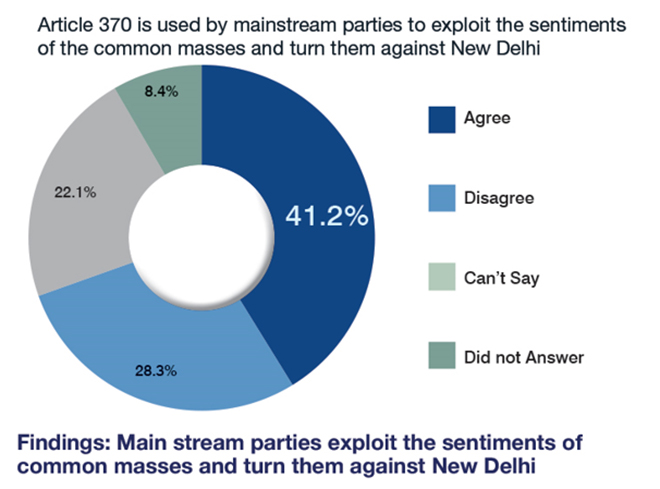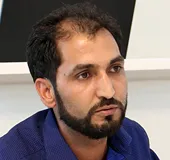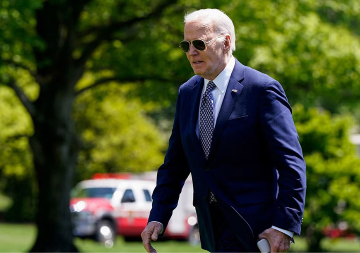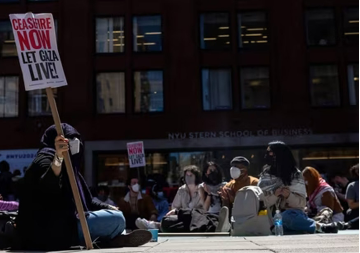
Eight former leaders of Jammu and Kashmir (J&K) led by Syed Altaf Bukhari who met Lieutenant Governor and the recent foreign diplomatic delegation are largely seen as the front runners in the efforts to restore political stability in the newly-carved Union Territory. Bukhari, a former PDP minister, has reportedly collected a bunch of disgruntled PDP MLAs and MLCs — besides the president of the Democratic Party Nationalist Ghulam Hassan Mir — to form a ‘third front’ in the absence of the top leadership of the PDP and NC who have been under arrest ever since the abrogation of Article 370 and Article 35A on 5 August 2019.
According to Raj Bhavan spokesperson, the meeting between the eight-member delegation and Lt. Gov. Girish Chandra Murmu marks the “beginning of the political process with mainstream political parties.” However, it is necessary to understand the local political undercurrents and the history of political instability in J&K as well as the current sentiments of the people of the region before one can see this development with hopeful eyes.
Democratic roots have always remained weak in Kashmir after its accession with India in 1947. Post independence local politics in J&K have revolved around appeasement of some affluent political families like Abdullahs, Bakshis, Muftis, Lones and other parochial interests, hijacking the peoples’ democratic will.
After the rigged election of 1951, Shiekh Abdullah ran the state as his fiefdom with help of New Delhi till his arrest in 1953 under the charges of espousing the cause of an independent Kashmir. Bakshi Ghulam Mohammed’s rule (1953-63) saw more ‘constitutional integration’ of Kashmir with New Delhi rather than the ‘integration of the people’ with the democracy of India. Bakshi’s “mafia-style authoritarianism” corruption saw the rampant use of private goons to muffle voices of dissent. New Delhi, sticking to its policy of appeasement, turned a blind eye on the happenings in Kashmir. Such an attitude of the Centre continued after 1977, when NC came back to power winning 47 out of the 77 seats. Abdullah once again resorted to his old ways to muzzle the opposition. He passed the infamous Jammu and Kashmir Safety Ordinance Act (SOA) in 1977, which was converted into the draconian Public Safety Act (PSA) in 1978, causing severe social crises and unrest.
Democratic roots have always remained weak in Kashmir after its accession with India in 1947. Post independence local politics in J&K have revolved around appeasement of some affluent political families.
The anger of the masses that had simmered for nearly two decades of NC’s autocratic rule, boiled over after the rigged election of 1987. In what is termed as a death of democracy in the state, the NC once again came to power, unleashing its tyranny with greater force. Opposition leaders were wantonly imprisoned, maimed and beaten by the administrative machinery. Many of the disgruntled youth went across the border, got trained by the Pakistani army and started violent insurgency against the state government as well as New Delhi in 1989. The insurgency that was born out of a state entrenched in corruption undermining the state authority and its institutions, with political-police-bureaucratic nexus made Kashmir a fertile ground for Pakistan to wage its proxy war against India. Decades of unending violence has deprived the poor and vulnerable of essential services, leaving them to fear for the safety of their family and suffer daily extortion.
Seen in the light of the aforementioned history, the efforts by the Syed Altaf Bukhari-led third front to re-enter J&K’s fragile political sphere with demands of restoration of statehood and extension of domicile laws seems to be a disguised attempt to create an illusion of political progress in the Valley at the behest of New Delhi. The establishment of such a third front at this critical juncture is not only against the will of local people, but is bound to become a tool for exploitation — just as Article 370 in the past — for the parochial gains of both the third front as well as New Delhi.
The abrogation of Article 370, which, according to New Delhi, was done for the promotion of greater devolution of powers and to strengthen democracy in the conflict torn Valley, then resorting to politics of appeasement — which the move by the ‘third front’ seems to represent — will in any case not work. New Delhi should not repeat the historical blunders of past but should remain vigilant against insurgency and focus on achieving the objectives of democratisation, economic development and integration of hearts.
Decades of unending violence has deprived the poor and vulnerable of essential services, leaving them to fear for the safety of their family and suffer daily extortion.
In 2017, when ORF conducted a detailed survey in Kashmir, a majority of the respondents agreed that Article 370 was used by mainstream political parties to exploit the sentiments of the common masses to turn them against New Delhi.

New Delhi must not forget that several members of this ‘third front’ have in the past been accused of many scandals, harming the local farming community during the aftermath of the floods of 1997. Most of these politicians who are trying to fill the political vacuum of J&K are scandalously known among the common masses with nick names, linking them with their misdeeds. The real objectives of the NDA government behind the annulment of Article 370 will remain oblivious if it falls prey to the attempts of these corrupt political elites of Kashmir to re-establish political structures in the newly-carved union territory. The democratic political culture — even if one emerges from such attempts — will continue to remain authoritative, working only for the parochial ends of the region’s political class and not for the development of the state and its people. Moreover, the abrogation of Article 370, which, according to New Delhi, was done for the promotion of greater devolution of powers and to strengthen democracy, good governance and sharp-eyed administration in the conflict torn Valley, will not be achieved. Far from its stated objectives, demands for statehood and domicile rights will become tools in the hands of Kashmir’s political class for the exploitation of common masses.
Post the annulment of Article 370, the NDA government seems to be clueless in terms of bringing back normalcy in Kashmir. The NDA should come clear on domicile rights and statehood and ensure that provision of good governance and sharp-eyed administration become the fundamental principles of any democratic political process that takes shape. In the absence of any constructive engagement by New Delhi post 5 August 2019, the locals continue to remain angry at the ‘business as usual’ environment, where good governance, robust administration and economic development remain distant dreams.
The NDA should come clear on domicile rights and statehood and ensure that provision of good governance and sharp-eyed administration become the fundamental principles of any democratic political process that takes shape.
Kashmir thus urgently needs political manoeuvring to start a new political process for democracy, through the will of the people, to triumph. The people of Kashmir have for decades believed that New Delhi conveniently resorts to politics of appeasement under its patron-client relationship with the local political elites. The people of the Valley, especially the youth, think that any ‘third front’ — at least this delicate juncture — seems to represent same historical political process that will not help to strengthen the fragile democracy in the newly-formed Union Territory.
Post the annulment of Article 370, the NDA government seems to be clueless on bringing back normalcy in Kashmir. It is better for New Delhi to give some time to the common masses and let sane democratic voices emerge from within the society. In the absence of any constructive engagement by New Delhi post 5 August 2019, the locals continue to remain angry at the ‘business as usual’ environment, where good governance, robust administration and economic development remain distant dreams. New Delhi, should wait till political transformation evolves from within. Such an evolution will require constructive and result-oriented engagement at various levels of the society. Any hurried marriage of convenience with tainted politicians will be another historical blunder.
The views expressed above belong to the author(s). ORF research and analyses now available on Telegram! Click here to access our curated content — blogs, longforms and interviews.





 PREV
PREV


